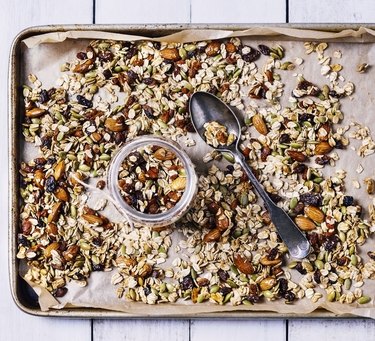
Finding foods to eat with gastroparesis can present quite a challenge, whether you're cooking at home or dining at a restaurant. But knowing which foods trigger the condition can help you create a gastroparesis-friendly diet plan to keep symptoms at bay.
Tip
The best way to manage gastroparesis is with a nutritious diet full of easy-to-digest foods like cooked fruits and vegetables, low-fat dairy and lean meats.
Video of the Day
What Is Gastroparesis?
Gastroparesis is an abnormally slow transit of food from your stomach to your small intestine, according to Harvard Health Publishing. It occurs when the vagus nerve — which is the nerve that controls your stomach muscles — is damaged or non-functional, says Michael Cline, DO, a gastroenterologist at the Cleveland Clinic.
Video of the Day
Per the Mayo Clinic, symptoms include:
- Nausea
- Vomiting, including vomiting undigested food hours after eating
- Bloating
- Abdominal pain
- Feeling full despite not eating much
- Acid reflux
- Malnutrition
- Weight loss
For some people, there's no known cause of their vagus nerve problems, according to the International Foundation for Gastrointestinal Disorders (IFFGD). In other cases, Dr. Cline says these underlying conditions may be to blame:
- Diabetes: Diabetes can damage your nerves — including your vagus nerve, which can result in gastroparesis.
- Connective tissue disorders: Diseases like scleroderma, multiple sclerosis or Parkinson's disease can likewise mess with your nerves and contribute to gastroparesis.
- Surgical complications: The condition can also develop following gastrointestinal surgery if the vagus nerve is compromised during the procedure.
- Medication side effects: Unrelated medications like narcotics or antidepressants can trigger a slowdown in normal digestive function.
- Viral infection: Some people report experiencing gastroparesis after recovering from a viral illness, though this is uncommon and usually resolves with time, according to the IFFGD.
A nutritious diet is the best gastroparesis treatment, according to the Cleveland Clinic. But if that isn't cutting it, your doctor may recommend medications to control the condition or its symptoms. In severe cases, you may need surgery to insert a feeding tube so food can bypass your stomach and go straight to your small intestine.
Foods to Eat With Gastroparesis

These are some healthy foods for gastroparesis to include in your diet, according to the Cleveland Clinic.
1. Easily Digestible Proteins
A well-rounded gastroparesis diet includes multiple choices from each major food group.
The Cleveland Clinic recommends eating easy-to-digest proteins such as:
- Lean meats like beef, pork and lamb
- Lean fish like tilapia and cod
- Poultry with no skin
- Eggs
- Reduced-fat peanut butter
- Pureed beans
- Tofu
2. Cooked Fruits and Vegetables
Skinning and cooking your fruits and vegetables helps break down some of the fiber that might otherwise irritate your stomach, according to University of Michigan Health.
Per the Cleveland Clinic, options include:
- Tomato juice, sauce or puree
- Mashed avocado
- Mashed cauliflower
- Peeled and cooked vegetables like squash, beets, carrots, mushrooms, potatoes and spinach
- Peeled and cooked fruits like baked apples and pears
- Canned, skinless fruit
- Bananas
3. Refined Grains
Whole grains are fibrous and can thus be difficult to digest with gastroparesis.
But these processed grains may go easier on your stomach, according to the Cleveland Clinic:
- White, seedless breads
- White rice
- Pasta
- Low-fiber cereal
- Pretzels
- Rice cakes
4. Certain Dairy Products
Dairy products are a good source of protein, vitamins and minerals, as long as you can tolerate them. Stick to fat-free or low-fat versions of the following foods, according to the Cleveland Clinic.
- Milk
- Yogurt
- Cottage cheese
- Cheese
- Sour cream
5. Nutritious Liquids
Fluids are easier on your digestive system than solid snacks, which is why the Cleveland Clinic includes liquids on the list of foods you can eat with gastroparesis.
Options for a liquid diet include:
- Water
- Fruit and vegetable juice or smoothies
- Milk
- Sports drinks
- Coffee
- Tea
- Flat diet soda
- Broths
- Fat-free soups or soups made with low-fat milk
Stay Hydrated
Good hydration is important to help you avoid common gastroparesis symptoms like nausea.
The U.S. National Academies of Sciences, Engineering, and Medicine recommends consuming 11.5 cups of fluid from beverages and food per day for people assigned female at birth and 15.5 cups for people assigned male at birth. Though these guidelines are from 2004, they're still regarded as healthy daily hydration goals.
Foods to Limit or Avoid With Gastroparesis

There are also certain foods you should avoid with gastroparesis. According to the Mayo Clinic, these are some common trigger foods.
1. Raw, Fibrous Fruits and Vegetables
High-fiber foods like raw fruits and vegetables can slow your stomach emptying. In some cases, this can lead to a solid mass of food called a bezoar, which can block your stomach and cause nausea, vomiting and further difficulty digesting, according to Johns Hopkins Medicine.
Raw produce can contribute to that problem, so it's best to limit or avoid all uncooked, unpeeled or dried fruits and vegetables, per the Cleveland Clinic.
2. Whole Grains
Fibrous grains can likewise be difficult for your stomach to process. The Cleveland Clinic recommends avoiding:
- Oatmeal
- Bran
- Granola
- Dense breads like bagels, dumplings or gnocchi
3. Nuts and Seeds
Fiber-rich nuts and seeds may be a strain on your digestive system. Per the Cleveland Clinic, common offenders include:
- Nuts
- Pumpkin seeds
- Chunky nut butters
- Popcorn
4. Fatty Foods
High-fat foods slow stomach emptying, which is why fat-free or low-fat options are preferable if you have gastroparesis. While certain fats like butter or cooking oils may be OK in moderation, the Cleveland Clinic suggests skipping these other fatty foods.
- Fatty meats like bacon, sausage and bologna
- Regular mayonnaise
- Lard
- Sweets like cakes, pies and cookies
- Cream products like whipping cream, ice cream and cream-based soups
- Greasy, fried foods like french fries or onion rings
5. Carbonated Drinks
Carbonated beverages can contribute to symptoms like bloating and feelings of fullness, according to the Cleveland Clinic. Instead, opt for water or other non-sparkling, hydrating drinks.
6. Alcohol
Alcohol can also aggravate gastroparesis symptoms and make it harder for your stomach to empty, per the Cleveland Clinic.
Tip
Working with a registered dietitian can help you create a customized diet plan that includes easily digestible foods and drinks, plus personalized guidelines for what foods trigger your gastroparesis.
Other Ways to Manage Gastroparesis
Treating gastroparesis isn't an exact science because the cause and symptoms of the condition vary from person to person, according to the University of Rochester Medical Center. You should always talk to your doctor about the best ways to approach your particular symptoms, but here are some general tips that may help you manage the condition.
1. Eat Small Meals
Help food pass through your stomach more quickly by sending smaller quantities of food to your digestive system at once, according to Indiana University Health. Generally, that means eating about four to six light meals a day.
As a bonus, this strategy may also reduce bloating and feelings of fullness.
2. Chew Your Food Thoroughly
Give your stomach a head start by chewing your food well so it's broken down by the time it hits your digestive system, according to the Mayo Clinic.
3. Exercise After Eating
Exercising lightly after eating, like taking a leisurely walk, can help kickstart the digestive process, per the Cleveland Clinic.
4. Avoid Lying Down After Eating
If possible, don't lie down for two hours after finishing a meal to encourage food to move down into your digestive tract, according to the Mayo Clinic.
5. Maintain Healthy Blood Sugar Levels
If you have diabetes, keeping your blood sugar levels in check can help mediate gastroparesis symptoms, according to the Cleveland Clinic. Work with your doctor or a registered dietitian to build a diet plan that helps stabilize blood sugar.
6. Talk to Your Doctor About Your Medications
If your gastroparesis is a side effect of a medication, work with your doctor to find new options that don't cause digestive upset, according to the Mayo Clinic.
- Harvard Health Publishing: “What's Causing That Belly Bloat?”
- Cleveland Clinic: “Gastroparesis"
- Mayo Clinic: “Gastroparesis”
- Indiana University Health: “Dietary and Lifestyle Recommendations for Patients With Gastroparesis”
- University of Rochester Medical Center: “Gastroparesis”
- International Foundation for Gastrointestinal Disorders: "Causes of Gastroparesis"
- Cleveland Clinic: "Diet for Gastroparesis"
- University of Michigan Health: "Following a Low-Fiber Diet"
- U.S. National Academies of Sciences, Engineering, and Medicine: "Report Sets Dietary Intake Levels for Water, Salt, and Potassium To Maintain Health and Reduce Chronic Disease Risk"
- Johns Hopkins University: "Gastroparesis"
Is this an emergency? If you are experiencing serious medical symptoms, please see the National Library of Medicine’s list of signs you need emergency medical attention or call 911.